
Photo from wikipedia
BACKGROUND Adolescent and young adult (AYA) patients with advanced solid tumours are often considered for phase I clinical trials with novel agents. The outcome of AYAs in these trials have… Click to show full abstract
BACKGROUND Adolescent and young adult (AYA) patients with advanced solid tumours are often considered for phase I clinical trials with novel agents. The outcome of AYAs in these trials have not been described before. AIM To study the outcome of AYA patients in phase I clinical trials. METHODS Clinical trial data of AYAs (defined as aged 15-39 years at diagnosis) treated at the Drug Development Unit, Royal Marsden Hospital, between 2002 and 2016, were analysed. RESULTS From a prospectively maintained database of 2631 patients treated in phase I trials, 219 AYA patients (8%) were identified. Major tumour types included gynaecological cancer (25%) and sarcoma (18%). Twenty-five (11%) had a known hereditary cancer syndrome (most commonly BRCA). Molecular characterisation of tumours (n = 45) identified mutations most commonly in TP53 (33%), PI3KCA (18%) and KRAS (9%). Therapeutic targets of trials included DNA damage repair (16%), phosphoinositide 3-kinase (PI3K) (16%) and angiogenesis (16%). Grade 3/4 toxicities were experienced in 26% of patients. Of the 214 evaluable patients, objective response rate was 12%, with clinical benefit rate at 6 months of 22%. Median overall survival (OS) was 7.5 months (95% confidence interval: 6.3-9.5), and 2-year OS was 11%. Of patients with responses, 36% were matched to phase I trials based on germline or somatic genetic aberrations. CONCLUSION We describe the outcome of the largest cohort of AYA patients treated in phase I trials. A subgroup of these patients demonstrates benefit, with several durable responses beyond 2 years. A sizeable proportion of AYA patients have cancer syndromes, significant family history or somatic molecular aberrancies which may influence novel therapeutic treatment options.
Journal Title: European journal of cancer
Year Published: 2018
Link to full text (if available)
Share on Social Media: Sign Up to like & get
recommendations!